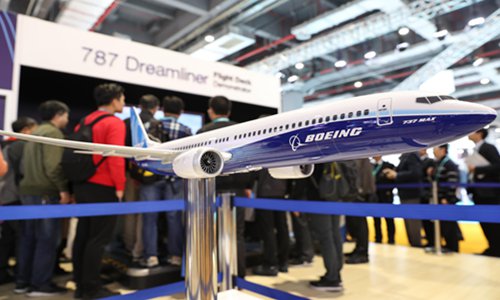
A model of the Boeing 787 Dreamliner jet is on display at the China International Import Expo in Shanghai on Thursday. (Photo: VCG)
The first China International Import Expo (CIIE), which concluded on Saturday in Shanghai, has signaled clearly that there is huge potential for China-US trade even though the two countries are now engaged in a bitter trade war, experts told the Global Times on Sunday.
Deals for intended one-year purchases of goods and services worth a total of $57.83 billion were reached at the CIIE, the Xinhua News Agency reported on Sunday, citing data from the CIIE Bureau.
A total of 172 countries, regions and international organizations, and more than 3,600 enterprises participated in the six-day event from November 5 to Saturday, which attracted more than 400,000 domestic and overseas customers, Sun Chenghai, deputy director of the CIIE Bureau, told a press conference on Saturday.
Nearly 180 US companies - in areas such as high-tech equipment, global logistics services, medical equipment and food and agricultural products - attended the CIIE, and were the third-largest group of overseas exhibitors after Japan and South Korea.
Honeywell International Inc, a Fortune 100 company, signed more than 10 cooperation agreements at the CIIE, according to a post on the company's official WeChat account on Friday.
One of the agreements was with China's State-owned Sinochem Group. By using Honeywell's connected plant technologies, Sinochem hopes to achieve better performance in cost control, production security, product delivery and environmental safety.
Honeywell also inked an agreement with Qingdao-based Hisense Group to build a leading internet logistics platform in the country.
"Although these US firms are generally confronted with huge pressure at home due to the trade war, they are willing to expand cooperation in the Chinese market or a third-party market," said Zhang Yansheng, chief research fellow with the China Center for International Economic Exchanges.
Huang Jianzhong, the dean of Shanghai University of International Business and Economics, said the expo showed there is still vast room for more complementary trade and cooperation between China and the US.
"The US firms have shown their confidence and expectations for China's market," Huang told the Global Times on Sunday.
Rather than simply selling traditional goods in China, the US companies are trying to stay in tune with the trends of consumption and high-tech upgrading in China.
"I have felt the changes over the years, going from selling products to selling services and management to China," William Yu, vice president and general manager at Honeywell Performance Materials and Technologies Asia Pacific, told the Global Times in a recent interview.
"If foreign firms want to gain a steady foothold and a share of the cake, they have to launch commodities and services that cater to the growing market," Zhang said.
Open wider
In addition to displaying products and services via the expo, some US firms also expressed their aim to invest directly in China.
For example, US chemical firm DuPont announced during the CIIE that it would invest over $80 million in a new specialty materials manufacturing plant in East China's Jiangsu Province.
However, for smaller US firms that do not have the capability to invest in China, "the annual import expo's help for their business is limited," according to Huang.
"They want China to lower the import tariffs and become more open, which would be beneficial for their business, based on our survey," said Huang.
But such a tariff reduction would "take time, since various factors should be taken into consideration, including the competitiveness of domestic industries," Huang said.


